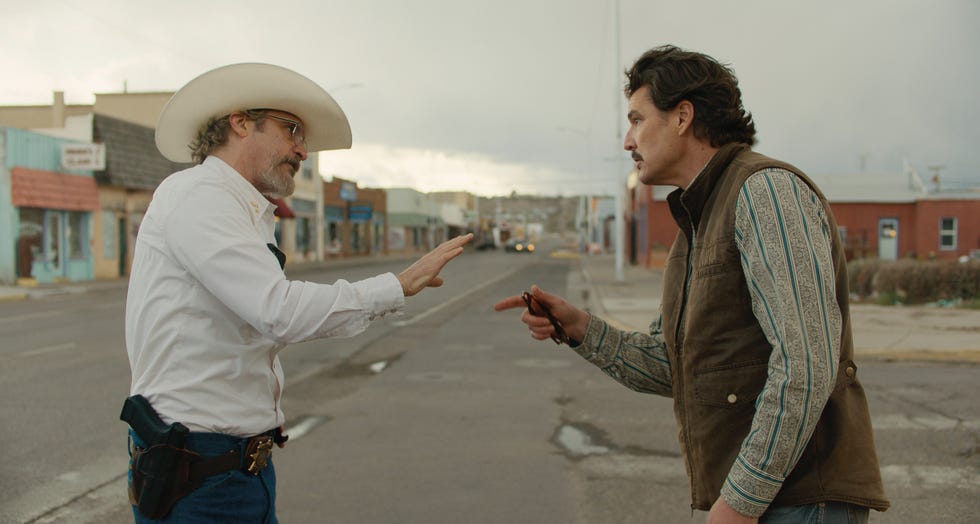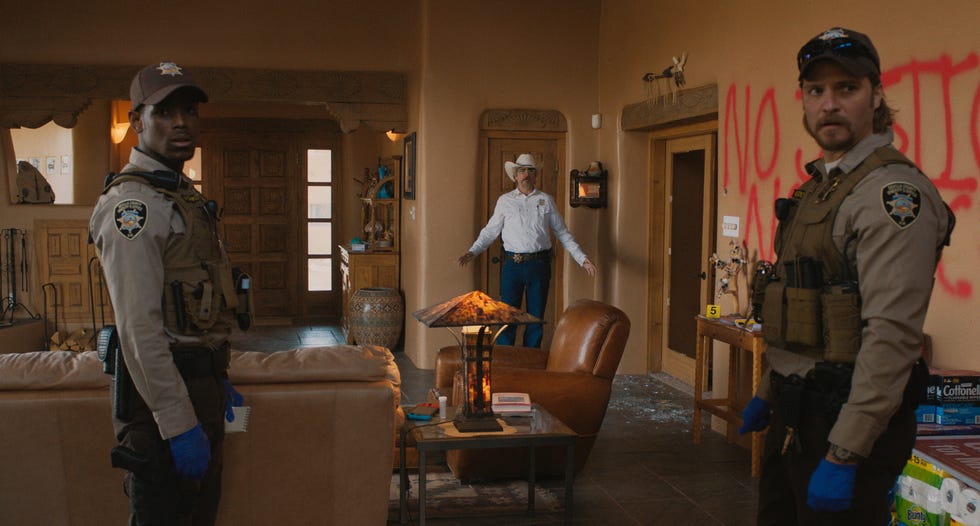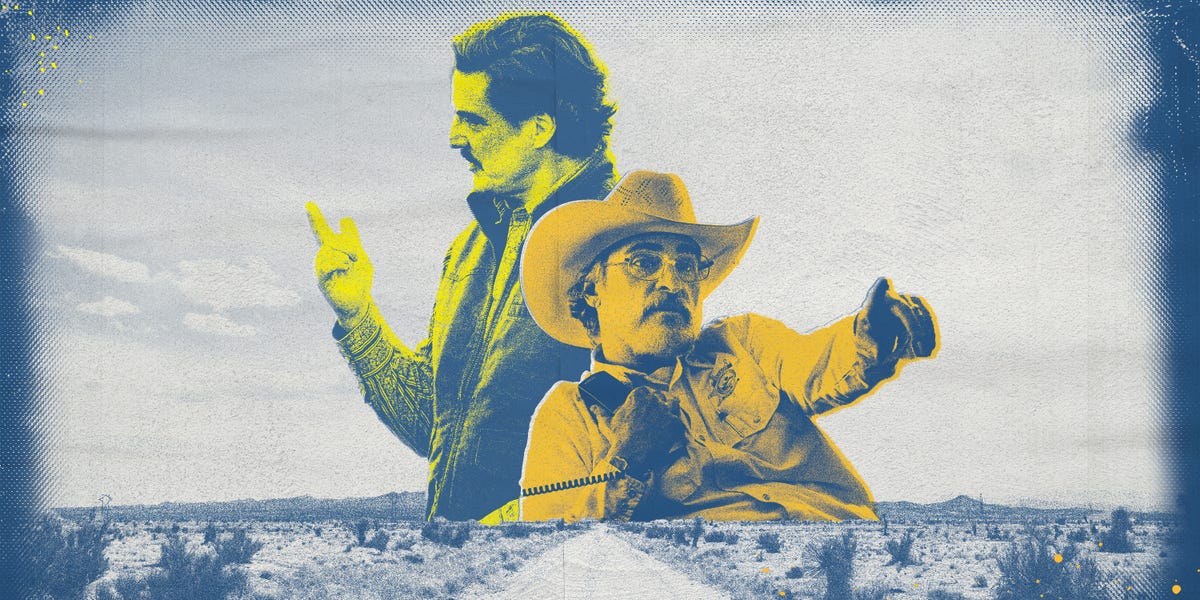“HEY, EVAN …”
Oh man. It’s a Sunday morning, I haven’t even had a cup of coffee yet, and now Joaquin Phoenix is saying my name. I had a Her poster on the wall of my college apartment bedroom; I’ve watched The Master in complete and utter awe on multiple occasions; And, look, I’m a man who was born in the early 1990s—of course Gladiator holds a special place in my heart. So hearing my name, in that voice, coming from the speaker of my phone is surreal to say the very least.
He continues: “Evan…”
Again: Oh man. It sounds like he’s got something to tell me.
We’re at the very end of an interview that I’ve just wrapped up with Phoenix and Pedro Pascal, centered on their roles in Eddington, Ari Aster’s new 2020-set black comedy neo-western conspiracy thriller. It’s an early east coast morning, but due to Pascal’s filming schedule in the U.K. for Avengers: Doomsday (where he’ll reprise his role as Reed Richards/Mr. Fantastic, which he’ll debut later this month in Marvel’s The Fantastic Four: First Steps), this is when things needed to be. But what is time, really, when you have the chance to talk about one of the most provocative movies of the year with its stars: an eccentric, Oscar-winning chameleon and the undoubtable star of the moment?
Our conversation was centered on Eddington, and so that meant talking about just a touch of the many themes that Aster, the writer/director behind surreal horror masterpieces Hereditary and Midsommar, and a previous collaboration with Phoenix, the exceptionally strange but mostly great Beau is Afraid, fit into the movie’s 2 hour and 25 minute run time. That includes talking about the peak Covid era in which the film is set (May 2020), ways to battle anxiety, and even a bit of a sweaty comparison to Gladiator. It meant breaking down the rivalry that anchors the film between Phoenix’s detestable lead character, Sheriff Joe Cross, and Pascal’s hypocritical local politician, Mayor Ted Garcia. And while Pascal was as personable and polished as ever, and Phoenix was delightfully open despite a bit of the awkwardness you see from him in every public appearance, we still landed in a place where I was wondering what, exactly, Phoenix wanted to say to me by the end.
“Evan, thank you,” he says.

Courtesy A24
Oh! Maybe he enjoyed the time then. After all, this is a man who once went full performance art on The Late Show with David Letterman while promoting one of his best movies, James Grey’s Two Lovers (an infamous cultural moment that he recently apologized for). He was perfectly charming during our conversation, but maybe he was about to give me a real piece of his mind.
“Thank you so much,” he said, again, repeating himself and continuing on an unexpected line of gratitude. “I… I thank you.”
OK! Sure. I thank you, Joaquin Phoenix. Glad everyone had a good time, because I sure did.
Eddington is sure to be one of the year’s most polarizing films, and one begging for discussion and analysis, but it’s done major favors by Pascal and Phoenix’s performances as a pair of very specific figures fitting into Aster’s strange, heightened, 2020 narrative. And the key word there, we must say, is heightened. This world is a mirror image of our own, but one where everything is kicked up about 100 notches. There’s stuff in here we’ll recognize, but also stuff that’s obviously not real, obviously inserted to make us laugh, to make us think, and, yes, for the purpose of making an exciting and outrageous movie. This isn’t a docudrama—it’s borderline absurdism. But grounding that absurdism with a pair of fantastic actors who are up to the task is the key to making it all work.
As Eddington arrives in theaters with its certain ticking time bomb of discourse, controversy, and pandemic reflection in tow, Men’s Health spoke with Phoenix and Pascsal about taking on these troubling characters, their keys to managing anxiety, and the most memorable on-screen slap in some time.
MEN’S HEALTH: You’ve both done Gladiator films with Ridley Scott. Would it be possible to view Eddington as a modern-day gladiator battle between these two characters?
JOAQUIN PHOENIX: You know, I didn’t even think about that.
PEDRO PASCAL: I didn’t think about it either.
JP: … No.
PP: [Both laughing] The answer is no. But I’m drawing interesting comparisons, because my character in Gladiator II was directly linked to Joaquin’s Empire, and there were even some flashback scenes that didn’t make it into the movie that put me in the arena…
JP: Really?
PP: Yeah, yeah, yeah—at your death. And at Maximus’s death, and that whole final part of the movie.
JP: Really!
PP: And the rose petals. But it got cut out. So, archetypically, he was the sort of—let’s say—villain, and then, at least in the presentation of Eddington, you wonder if Ted Garcia is a villain. They’re very, very different [both laugh again]. In the movie, Joaquin’s character, Joe, and my character, Ted, their facing off is a bit arena-like, actually.
MH: Exactly! I’m thinking of the “six feet away” scenes. Obviously, the film is moreso a modern western, so that must be primarily where inspiration is coming from there.
PP: Yes, and I think Ari’s visual intention in that kind of oner—I hate when I try to talk like I’m knowledgeable about filmmaking. I just expose how unknowledgeable I am.
JP: We all are.
PP: Is it a oner?
JP: I don’t know!
PP: It’s a two-shot, and it’s a wide… [both laugh]. Well, it looks very Western. That scene particularly—it looks like a stand-off.

Courtesy A24
MH: Joaquin, Sheriff Joe is our protagonist in this story, but he makes a lot of questionable choices throughout the film. How do you, as a performer, get on board with everything he’s doing and get into the proper mentality as someone who’s going to be making these increasingly reckless decisions?
JP: I guess without judgement. I don’t know. I feel like I, and everyone I know, have made questionable choices. So, for me, it was to approach it with sincerity, and without judgement, and to try to understand the personal factors that are motivating Joe, to try to approach it from the inside out, I guess.
MH: Much of this film is about striking the balance between managing a crisis, and keeping anxieties—both personal and collective—in check. How do each of you like to calm down and settle yourselves when facing potentially anxiety-inducing situations?
JP: Oh, man. You know today, honestly… this is so, so stupid. I don’t have a good answer. Oh, god. I can’t do it. Oh, man. OK. I fail at this all the time, but I want to respond to the moment with sincerity. And I don’t really know what that means, because in my brain, I get into situations that are stressful, and it makes me anxious, and it makes me want to try to separate myself from whatever’s happening, and stand above it, and feel like there’s something where I’m right, and whatever is making me uncomfortable is wrong, and it’s something to mock. I want to try more and more to respond with sincerity and thoughtfulness and compassion to the moment, for myself and whatever the situation is.
PP: I notice, especially during this period of the summer 2020, and the kind of isolation and how long my FaceTimes were, and my phone conversations, that I had started to make an effort to engage more, having previously lost that option in many ways. I can think back on high school, and college, and I was always such a talker with friends. Conversations on the phone, and then I don’t know how many days had gone by where we stopped doing that.
It’s something that I’ve held onto very much. I was always one to reach out when I’m, as you say, facing something that is challenging or making me anxious. I definitely kind of stopped doing that, and instead I’m doomscrolling, or looking for something to watch; looking for different ways to disassociate from the feeling I’m having. And then, when it started to feel so critical, I had to go back to what was always the comfort for me in life, which was engagement in my relationships, my friendships, and conversation and shared experience.
“Finding some HUMOR in some of the ABSURDITY of those moments, in the midst of some of that DARKNESS, felt like it was VITAL.”
MH: Building on all of that, this story takes place in a very anxiety-inducing time in recent American history, in the early days of the Covid pandemic. It’s generally a time that most people probably don’t want to think too much about—why were you both eager and interested to explore it for this film?
JP: Because it wasn’t easy. Because it was something to challenge you, and sometimes you have to walk toward what’s uncomfortable, and that’s maybe the best way to reflect. You certainly can’t pretend it didn’t happen, or pretend that we didn’t respond to the moment in the way that we did. There was also something about this where it was challenging us all, as an audience, to face this moment, but also opening up this pressure valve and letting us laugh about it. Finding some humor in some of the absurdity of those moments, in the midst of some of that darkness, felt like it was vital. It felt like it was important for somebody to step forward and to do that.
MH: You guys seem very close on the red carpet, but your characters hate each other. What’s the key to channeling that on screen, but keeping things light when the cameras aren’t rolling?
JP: No, what’s on film is the reality, and what we’re doing in the press is acting.
PP: Yeah. [Both laugh]. You should see, now that there’s no camera on us… speaking of Gladiator, I approached the phone so you could hear me, but I have a shield and a taser. And if he gets close, he knows what’s going to happen. I’m going to tase his ass. [Both laugh]
JP: What was the question?
PP: How we get along. Look, Joaquin is a wonderful actor, and he’s a wonderful scene partner. I’ve had work where sometimes you don’t have chemistry in a personal way with somebody, but the person you’re working with has tremendous skill. And when you have your script, and you’re on stage, or you’re in front of the camera, it works just because you’re scene partners to each other. In a very, very, very, very simple way, Joaquin is an incredible scene partner, and it isn’t a lot more than that. He doesn’t like me [both laugh]….
JP: It’s real life, and when you boil this down—and Joe [Joaquin’s character in Eddington] wouldn’t be able to articulate this, but Joe doesn’t really hate Ted, because he doesn’t know Ted. He doesn’t know who he is. He’s based his entire idea of Ted on rumor and innuendo. And even though they’ve grown up in this small town, and they have this history, and they probably went to the same school, and Ted’s family’s been a big deal in this town, the truth is that he’s never really sat down and had a conversation with Ted, and just asked him how he is.
So, really, Joe is just mad at his own pain, and his own dissatisfaction with his own life. His dissatisfaction is with his lack of control over his own life. Ted is the recipient of all of that anger. And I think if you understand that, we’ve probably all felt like that. We’ve all felt dissatisfied with our lives, or impotent, or unable to get out of a rut. And we’ve funneled that, often times, toward people who don’t necessarily deserve it. And I think that’s part of it. For me, it was finding, what is it that Joe wants, and why is he not getting that, and what is that sense of frustration, and that anger, and how does that get spread out into the world.

Courtesy A24
MH: Maybe the best scene in the movie is when there’s a noise complaint at Ted’s house, and Joe answers the call and comes, and it ends with Ted slapping Joe in the face. Can you walk through filming that scene?
PP: Can I tell the truth?
JP: Please, yeah!
PP: I was not comfortable with slapping Joaquin. I even tried to take a stance… [both laughing] and spoke with the stunt coordinator, and took the position that I am not comfortable with a slapping. And then we got to shooting it, and I tried to fake it, and Joaquin said ‘You’ve got to do it.’ And it was a surreally fast exchange in between takes, of ‘That didn’t work.’ Joaquin saying ‘You’ve got to do it.’ And me saying ‘I do?’ And he said ‘Yes.’ And we did it, and we went right into ‘Action,’ and I smacked the shit out of him.
JP: And he loved it!
PP: No, actually! I didn’t love it. I think what I loved, is that Joaquin was right, and how quickly he communicated it, and how quickly I understood it, and that felt like partnership. It felt like this is somebody that I’ve known a long time, that I’ve worked with a long time, and this is just a few days into spending time with him. And I loved that, but it actually was really hard for me. Ironically, I think it was harder for me than it was for him. It’s not nice to hit somebody—it doesn’t feel good. Many people would argue with that. I might love to break a chair or something like that, but I don’t want to hit somebody. So, that was really hard actually. It was really hard.
“We did it, and we went right into ‘ACTION,’ and I SMACKED THE SHIT out of him.”
MH: Joaquin, what was that like on your end?
PP: He was like, ‘Please don’t hit me,’ and I smacked him really hard.
JP: Well, no, I mean, it was important. Initially, the scene, when I first had that scene, it was like a two-page scene of talking, and as Ari and I worked through it, it just felt like, ‘OK, these characters have said everything they could possibly say to each other. What more are they arguing with?’ And it just feels like we’re at this point where it needs to just be reduced to impulsive, caveman reactions. Enough of trying to explain things to each other. So, I was very clear on what was important, and, therefore, then, that moment has to be electric. And that’s a oner…
PP: That is a oner! [Both laugh]
JP: And so there were also a lot of technical things that have to be worked out, because I think it starts with me driving in, as a matter of fact.
PP: Yeah, you’re pulling in.
JP: And, so, you’re driving in from down the road, you’re getting out of the car, walking through, and so there’s all this time, for me, as the character, and me as the actor, and just this anticipation that’s building up, leading to this moment. And yet wanting it to feel like it’s shocking. It seemed to have an energy to it, which felt really important.
This interview has been edited for content and clarity.
Related Stories
Evan is the culture editor for Men’s Health, with bylines in The New York Times, MTV News, Brooklyn Magazine, and VICE. He loves weird movies, watches too much TV, and listens to music more often than he doesn’t.
